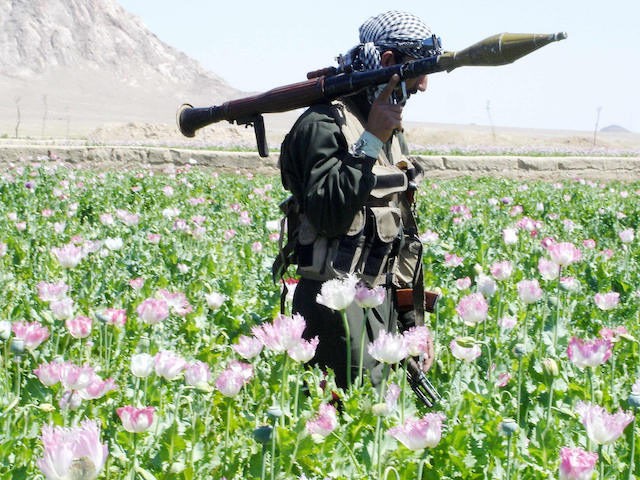Ian McCary, the U.S. Charge d’Affaires for Afghanistan, on Monday praised the Taliban regime for supposedly banning the cultivation of opium poppies.
“Outlawing the production of narcotics in Afghanistan is a positive first step but enforcement will be key. Having a healthy and licit agricultural sector will help Afghanistan’s economy and ultimately the Afghan people,” McCary said on Twitter.
Some of the responses to McCary’s tweet questioned the validity of the Taliban edict against opium production or dismissed it as a fraudulent effort to fleece money from the international community.
The Taliban’s deputy prime minister, Abdul Salam Hamafi, asked for international donations to shift Afghanistan’s farms to other crops soon after the ban was announced. The U.N. has already asked donors for another $4.4 billion in humanitarian aid to Afghanistan.
According to the United Nations, Afghanistan supplies over 80 percent of the world’s opium products, and the illicit industry generates nearly $2 billion in income that would be difficult to replace, to put it mildly.
Most Afghan farmers in the major opium provinces devote at least some of their land to growing poppies and some have abandoned other crops entirely, exacerbating the national food shortage. Poppies are used as a form of currency, with farmers using the promise of the next harvest to buy food and supplies on credit. Under Taliban rule, Afghanistan is already teetering on the brink of mass starvation because its people cannot afford to buy food.
The alleged opium ban was presented on Sunday as a decree from Taliban Supreme Leader Haibatullah Akhunzada that said: “cultivation of poppy has been strictly prohibited across the country.”
“If anyone violates the decree, the crop will be destroyed immediately and the violator will be treated according to the Sharia law,” Akhunzada said at a Kabul news conference.
Al Jazeera News cited Afghan farmers and Taliban sources who said “tough resistance” to the poppy prohibition was expected since production surged in recent months and prices have nearly doubled based on rumors of an impending ban.
“Other crops are just not profitable,” a poppy farmer told Al Jazeera.
“We will be forced to steal,” another complained to AFP, which noted the opium industry supports tens of thousands of jobs.
The U.N. has long regarded the Afghan opium trade as a major security risk – and a major source of funding for the Taliban insurgency. Although the Taliban claims poverty when asked to feed or care for the people they rule, U.S. officials believe Taliban leaders have hundreds of millions of dollars in drug revenue stashed away.
Heroin sourced from Afghanistan is a relatively minor factor in the deadly U.S. drug scene, but it plays a much larger role in Canada, Europe, and Africa.
Opiates are also popular in neighboring Iran, whose heavily patrolled border was penetrated by enterprising Afghan smugglers using catapults. Afghanistan itself has a notorious community of drug users camped around the Pul-e-Sukhta bridge in Kabul.
The Taliban claimed to try banning opium harvesting several times before the U.S. invasion in 2001 but rescinded the bans under pressure from irate harvesters.
Taliban negotiators promised to “reduce poppy cultivation and drug trafficking to zero throughout the country” during peace negotiations in 2019, although they demanded foreign financial assistance in exchange for shutting down the narcotics trade.
The Taliban also reportedly made commitments to China to reduce the drug trade when bargaining for railroads built by China’s Belt and Road Initiative (BRI). Some of China’s proposed rail lines would pass through Afghanistan’s top opium-producing region.
The Taliban said it was “saddened” to find so much drug abuse when it took control of Kabul in August 2021. “From now on, Afghanistan will be a narcotics-free country.” the group pledged.
Foreign observers noted the Taliban’s idea of drug rehabilitation was characteristically brutal, with no provisions made for the pain and sickness of withdrawal.

COMMENTS
Please let us know if you're having issues with commenting.